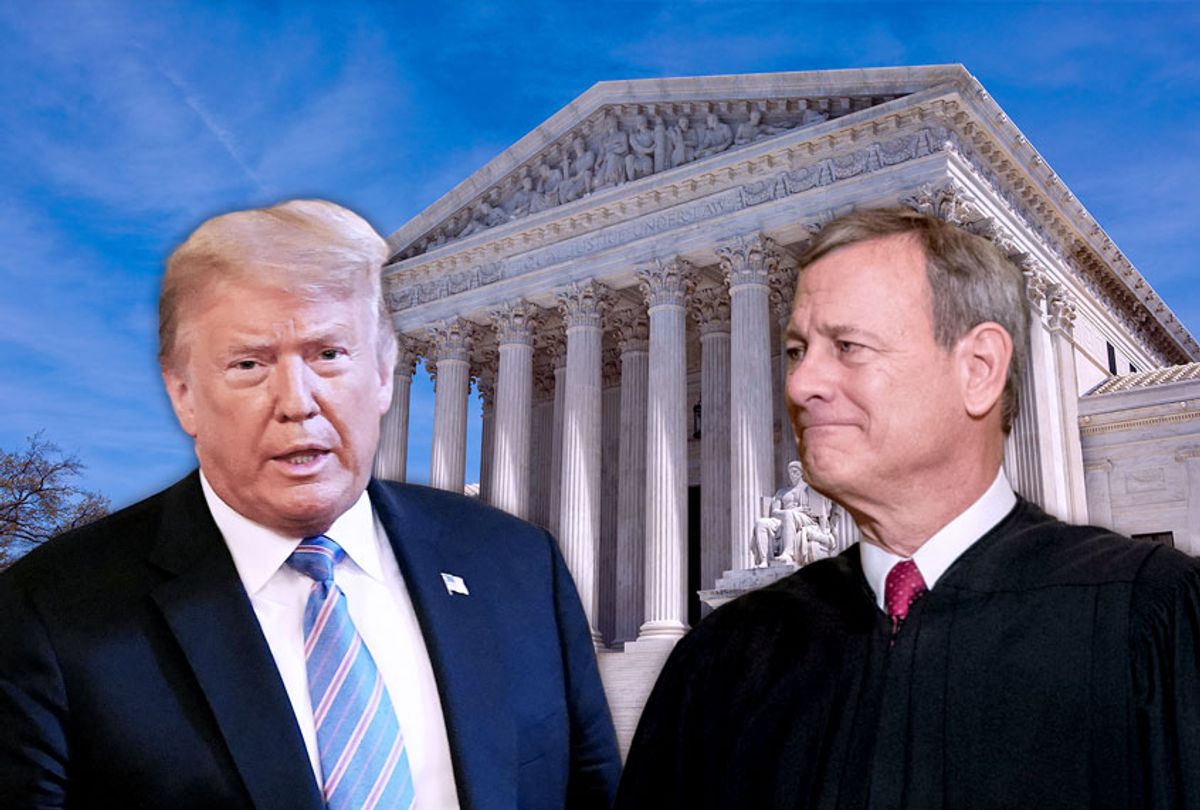The Supreme Court upheld two Republican-backed Arizona voting restrictions on Thursday that Democrats argue will make it significantly harder for minorities voters to cast a ballot.
The case, Brnovich v. Democratic National Committee, serves as an important legal benchmark for how the Voting Rights Act can be applied in instances of potential voter discrimination. In a 6-3 ruling, with justices appointed by Republican presidents all aligned in the majority, the Supreme Court found that the two restrictions do not impose an undue burden on minority voters, opening the floodgates for substantial voter suppression in the Grand Canyon state, progressives argue. By essentially striking down Section 2 of the Voting Rights Act, voting rights activists argue, the conservative-majority on the Supreme Court effectively doomed the Department of Justices' planned lawsuits against voter suppression efforts by Republican lawmakers in Georgia following Donald Trump's promotion of the Big Lie.
The first Arizona restriction upheld by the Supreme Court by was enacted ahead of Trump's election in 2016 when the state's GOP-controlled legislature outlawed a practice known as "ballot harvesting," which effectively allows community organizations and other third parties the legal authority to deliver ballots collected on behalf of consenting voters. The Arizona law, however, made ballot harvesting by civic and political groups a felony punishable by up to one year in prison with a $150,000 fine.
Of this rule, Justice Alito, a conservative, wrote on Thursday in a majority opinion: "Having to identify one's own polling place and then travel there to vote does not exceed the 'usual burdens of voting,' adding that the overall impact of the measure on minority voters was "small in absolute terms."
The second restriction concerns ballots that are cast in the incorrect precinct, known as "provisional ballots." Back in 2016, the Arizona legislature prohibited provisional ballots from being either partially or fully counted in any election.
Writing for the majority, Justice Alito argued that Democrats failed to demonstrate how a prohibition on provisional ballots has a disparate effect on voters of color.
"Limiting the classes of persons who may handle early ballots to those less likely to have ulterior motives deters potential fraud and improves voter confidence," he contended.
Shortly after the passage of these restrictions back in 2016, the Democratic National Committee sued the state of Arizona, alleging that the rules violated the Voting Rights Act, which prohibits the enforcement of discriminatory voting regulations at the state level. Section 2 of the act specifically bans "any voting standard, practice, or procedure that results in the denial or abridgment of the right of any citizen to vote on account of race, color, or membership in a language minority group."
At first, a U.S. district court ruled in favor of Arizona's side. However, the U.S. Court of Appeals for the Ninth Circuit overturned the district court's ruling. The appellate court decided that the laws "imposed a significant disparate burden" on Black, Latino, and Native American Arizonans looking to cast a ballot. This prompted both Arizona and the Republican National Committee (RNC) to appeal the Ninth Circuit's ruling to the Supreme Court.
The Court held oral arguments back in early March, where justices discussed how Section 2 could be applied to Arizona's case. The court's conservative wing appeared to side in large part with the state, while liberal justices expressed far more opposition to the bills.
"What if the provision results in a 1 percent decline in participation by minority voters? Is that substantial enough?" conservative Chief Justice Roberts asked Democratic lawyers, suggesting that a 1% reduction in turnout might be negligible.
"There's a difficulty that the statutory language and its lack of clarity presents in trying to figure out when something crosses from an inconvenience to a burden," echoed Justice Barrett.
In one rather bizarre line of questioning, GOP lawyer Michael Carvin just about admitted that rescinding the restrictions would hamper the GOP's electoral position. Lifting the rules, Carvin explicitly argued, would put Republicans "at a competitive disadvantage relative to Democrats. Politics is a zero-sum game. And every extra vote they get through unlawful interpretations of Section 2 hurts us. It's the difference between winning an election 50-49 and losing an election."
In a dissenting opinion, Justice Elena Kagan wrote that the ruling is "tragic" because "the Court has (yet again) rewritten – in order to weaken – a statute that stands as a monument to America's greatness, and protects against its basest impulses." She continued: "What is tragic is that the Court has damaged a statute designed to bring about 'the end of discrimination in voting."
The Supreme Court's ruling is especially consequential because it comes amid a broader Republican-led push to legislate a wave of voting restrictions in various states throughout the nation – all of which appear to be motivated by the baseless allegation that Trump lost the 2020 election as a result of system fraud. If other Democratic challenges are to be made against a prohibition on ballot harvesting and the use of provisional ballots, lowers courts may defer to today's Supreme Court ruling.



Shares